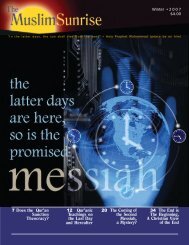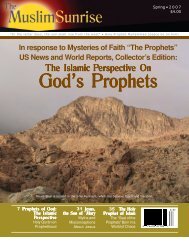“O soul at rest thathas found comfortin God return toyour Lord, you wellpleased with Himand He wellpleased with you.Now join Mychosen servantsand enter into MyGarden”(89:28-31)“Every soul shall be paid in full” (2:281),(3:30); “As far those who say, Our Lord isAllah, and then remain steadfast, the angelsdescend upon them, saying: Fear not, norgrieve, and rejoice in the Garden that you werepromised. We are your friends in this life andthe Hereafter. <strong>The</strong>rein you will have that yoursouls desired” (41:31-32). “And no soulknows what joy of the eyes is kept hidden forthem, as a reward for their good works”(32:18).It is obvious that the term soul is frequentlyused (both in singular and plural forms) forliving person(s). <strong>The</strong> famous quote from theQuran:“Every soul shall taste of death” (3:185),(21:35), (29:57), clearly refers to everythingthat has life. Death of a person is mentionedat various places as death of a soul. Forexample, “And no soul dies but by the leaveof God, — a decree with a fixed term” (3:146).“And no soul knows what it will earntomorrow, and no soul knows in what land itshall die” (31:35). “We prescribed for theChildren of Israel that whosoever killed a soul(mun qatala nafsum)” (5:32). “You slay notthe soul God has forbidden” (6:152). “Mosessaid, My Lord, I killed a soul from among them(inni qatalto minhum nafsan)” (28:33).consistent striving, Soul reaches anelevated state of being firmly connected withGod. At this stage it is called the soul at rest –the contented souls (Nafse-Mutma’innah):“O soul at rest that has found comfort inGod return to your Lord, you well pleased withHim and He well pleased with you. Now joinMy chosen servants and enter into MyGarden” (89:28-31).Accountability of souls is one of the vastlydiscussed themes of the Qur’an. After assuringmankind that:“No soul is charged save to its capacity”(2:234), (6:153), (7:43). “And fear the daywhen no soul shall serve as a substitute foranother soul at all, nor shall intercession be14 <strong>Muslim</strong><strong>Sunrise</strong>accepted for it; nor shall ransom be taken fromit; nor shall they be helped” (2:49).<strong>The</strong> believers are reminded to look aftertheir souls as they stand responsible for all theydid in this life (5:106) because:“God may recompense every soul for itsearnings” (14:51). “And let alone those whotake their religion for sport and a pastime, andwhom worldly life has beguiled. And admonishpeople thereby lest a soul be given up todestruction for what it has earned” (6:71). “Ifyou do good, it is your own souls you do goodto” (17:7), (17:15), (35:18), (39:41), (73:20).“Let every soul consider what it has forwardedfor the morrow” (59:18).Punishment and reward for the souls arefully covered in the Qur’an:But again, Soul (nafs) is something thatdeparts at the time of death:“And if you could only see, when thewrongdoers are in the agonies of death, andthe angels stretch forth their hands, saying,Yield up your souls (akhrijoo anfusakum)”(6:94). “Allah takes the souls of men at thetime of their death” (39:42).In the Qur’anic terminology, the term Soul(nafs) can also be translated as heart or mindor human conscience: “and whether youdisclose what is in your minds/hearts (fianfusakum)” (2:285); “<strong>The</strong>y hide in theirminds/hearts what they disclose not to you”(3:155). “Allah knows best what is in theirhearts” (11:32). “Your Lord knows best whatis in your minds/hearts (fi nufuse kum)”(17:26). “And assuredly We have created manand We know what man’s mind (nafso ho)whispers in him” (50:17). “<strong>The</strong>y denied them,though their souls acknowledged them”(27:14).<strong>The</strong> terms Spirit (Ruh) and Soul (Nafs) bothhave also been used in the Holy Quran withreference to God’s nature. <strong>The</strong> difference isthat God’s Spirit (Ruh) is always used as anoun, while God’s Soul (Nafs) is used as a
pronoun, as in Himself – (nafsihii). He has takenupon Himself (kataba la nafsihi) to show mercy(6:12). Similarly, Your Lord has taken uponHimself (kataba rubbo kum la nafsihi) to showmercy. (6:55). Only at one place in the Qur’an,Soul (Nafs) of God is referred to as noun, but itdoes not indicate God having a soul. It indicatesGod’s All-Knowing Self – His mind. In responseto God asking a question of the Prophet Jesus as ,Jesus as would say: You know what is in my mind(fi nafsi), and I know not what in Your mind/knowledge (fi nafsika) (5:117).<strong>The</strong> use of the word Spirit belonging to Godis evident in the following verses:“And remember when your Lord said to theangels, when I have fashioned him (man/basher) in perfection and have breathed intohim My Spirit, (wa nafakhto fihi min Ruhii) fallye down in submission to him” (15:29-30),(38:72-73). “And He began the creation of man(insaan) from clay; then He made his progenyfrom an extract of an insignificant fluid; thenHe endowed him with perfect faculties andbreathed into him of His Spirit. (wa nafakhafihi min Ruhihii)” (32:8-10). “And rememberher (Mary) who preserved her chastity; so Webreathed into her Our Spirit and We madeher and her son a Sign for peoples” (21:92).“And the example of Mary, the daughter ofImran, who guarded her private parts – soWe breathed into her Our Spirit – and shefulfilled in her person the words of her Lordand His Books and was one of the obedient”(66:13).At a few places in the Qur’an, the Spiritand the angels are mentioned together. Forexample:“<strong>The</strong> angels and the Spirit, ascend to Himin a day the measure of which is fifty thousandyears” (70:5). “On the day when the Spiritand the angels will stand in rows, they shallnot speak except whom the Gracious God willpermit and who will speak only what is right”(78:39). “<strong>The</strong> Night of Destiny is better thana thousand months. <strong>The</strong>rein descend angelsand the Spirit by the command of their Lord– with every matter” (97:4).God’s Spirit or/and angels also appears tosome in human form. For example:“We sent Our Spirit to her (Mary, themother of Jesus) and he appeared to her inthe form of a perfect man” (19:18).<strong>The</strong> angel Gabriel (Jibril) who brings downGod’s revelations to man is also called theSpirit in Qur’anic terminology, sometimeswith added adjectives such as the Faithful“Say It is brought down by the Holy Spirit from yourLord with truth, that He may strengthen those whobelieve and as guidance and glad tidings for<strong>Muslim</strong>s” (16:103). “And verily this (Qur’an) is arevelation from the Lord of all the worlds. <strong>The</strong> Spirit,faithful to the trust, has descended with it on yourheart, that you may be of the Warners in plain andclear Arabic language” (26:193-196).Spirit and the Holy Spirit – Ruh-ul-Ameen and Ruh-ul-Qudus. We read in theQur’an:“Say It is brought down by the HolySpirit from your Lord with truth, that Hemay strengthen those who believe and asguidance and glad tidings for <strong>Muslim</strong>s”(16:103). “And verily this (Qur’an) is arevelation from the Lord of all the worlds.<strong>The</strong> Spirit, faithful to the trust, hasdescended with it on your heart, that youmay be of the Warners in plain and clearArabic language” (26:193-196).In this verse the faithful Spirit (Ruh-ul-Ameen) is the angel Gabriel as it is evidentfrom reading another similar verse of theHoly Quran:“Say, Whosoever is an enemy toGabriel — for he it is who has caused it(the Qur’an) to descend on your heart bythe command of Allah, fulfilling that(revelation) which precedes it, and isguidance and glad tidings to thebelievers” (2:98).<strong>The</strong> Holy Spirit is given to all theMessengers of Allah and their followersto confirm their truth and to strengthenthem against bitter opposition andpersecution. <strong>The</strong> Qur’an says:“And verily We gave Moses the Bookand caused Messengers to follow in hisfootsteps after him; and to Jesus, son ofMary, We gave manifest Signs, andstrengthened him with the Spirit ofholiness (bi Ruh ul Qudus). Will you then,every time a Messenger comes to you withwhat you yourselves (anfusakum) desire not,behave arrogantly and treat some as liarsand slay them?” (2:88); “And We gaveJesus, son of Mary, clear proofs, andstrengthened him with the Holy Spirit (biRuh ul Qudus)” (2:254), (5:111).God strengthens the Messengers with theSpirit and also the believers who followthem. Referring to the believers, Allah says:“<strong>The</strong>se are they in whose hearts He hasinscribed true faith and whom He hasstrengthened with the Spirit from Himself(ayyada hum bi Ruhim min ho)” (5:23).<strong>The</strong> Qur’an also uses the term Spirit(Ruh) for Divine revelations:“He (God) sends His Spirit (Ruha) by Hiscommand (amr) upon whosoever of Hisservants He pleases, that He may givewarning of the Day of Meeting” (40:16).And it is not for a man that Allah shouldspeak to him except by revelation, or frombehind a veil, or by sending a “messengerto reveal His command what HE pleases.Surely He is High, Wise. And thusWe haverevealed to you the Spirit by Our command(Ruh ammin amrina). You did not knowwhat the Book was, nor what the faith”(42:52-53).In the context of these verses, it isclear that the term Spirit means the Wordof God, which is the Qur’an, throughwhich a morally dead people receivednew spiritual life. WINTER <strong>2006</strong> 15










